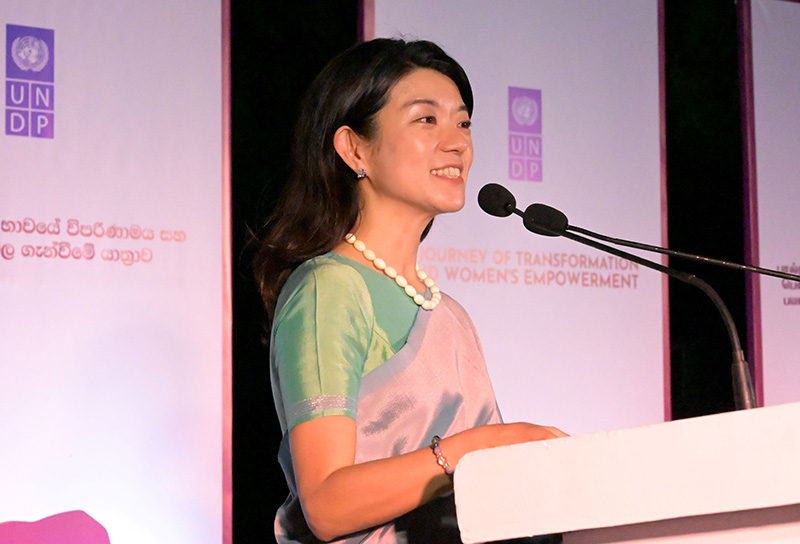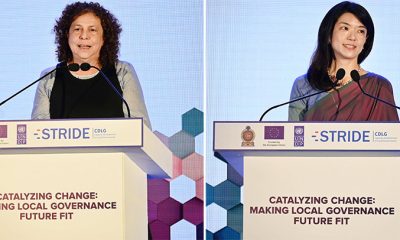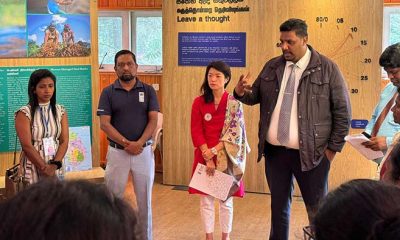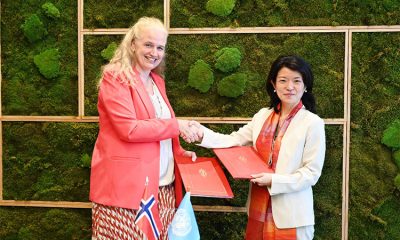News
UNDP exhibition highlights women’s struggles amidst economic hardships and calls for gender equality action

UNDP Resident Representative in Sri Lanka Azusa Kubota says that women in households have been at the forefront of taking the brunt of the hardships while trying their very best to protect the well-being of their families and communities, with fast-disappearing economic means.
She said so speaking at the Launch of UNDP’s Mobile Interactive Gender Exhibition‘A Journey of Transformation and Women’s Empowerment’ held from the 7th to 10th of March, 2024 at the National Museum, Colombo.
She said: Colombo is the 3rd destination for this exhibition. It first started in Kandy in November last year, followed by Kurunegala last week. We are thrilled to open the exhibition at this historic museum in the Nation’s Capital on the eve of International Women’s Day with the theme of ‘Invest in Women’. And we are deeply grateful for your presence to witness its opening.
We have come a long way as a global community, yet we know that gender bias persists, well into the 21st century.
No matter where women live, women are paid less, shoulder more unpaid housework, child and elderly care, and are wildly under-represented in leadership roles both in the public and private sectors. In 59 countries where women are now more educated than men, their income is still on average a staggering 39 per cent less. Women are better educated than ever before, including here in Sri Lanka, but this has not been enough to close the income gap.
Here in Sri Lanka, in the aftermath of a series of cascading crises, 31% of Sri Lanka’s population lives in poverty. Sri Lanka’s first Multidimensional Vulnerability Index (MVI), published last year by UNDP Sri Lanka and Oxford University, outlines that 55.7% of Sri Lankans are multidimensionally vulnerable.
Women in households have been at the forefront of taking the brunt of the hardships while trying their very best to protect the well-being of their families and communities, with fast-disappearing economic means.
Over and above the economic hardships, women continue to face violence. Even before the pandemic, the 2019 Women’s Wellbeing Survey, conducted by UNFPA and the government, revealed that in Sri Lanka, one in five ever-partnered women have experienced physical and/or sexual violence by an intimate partner in their lifetime. 1 in 4 have experienced physical and/or sexual violence since age 15 by a partner or non-partner.
It is not hard to imagine that the growing socio-economic pressures have resulted in increased incidents of violence against women, as witnessed globally during the COVID-19 pandemic.
Gender equality is the 5th Sustainable Development Goal, and its principle is the foundation for all 17 Goals. It is because inequality hurts, and a sustained development process is not possible by leaving half of the global population behind in decision-making processes. A recent UN study estimated that if we continue at the current pace, we will need another 300 years to achieve gender equality.
Then we must ask the question – what would it take to accelerate our efforts towards gender equality? Certainly, we do not have 300 years to wait around.
And in UNDP we believe that the solution lies in shifting our mental models. UNDP’s most recent Gender Social Norms Index (GSNI) 2023 quantifies biases against women, capturing people’s attitudes on women’s roles along four key dimensions: political, educational, economic and physical integrity. The report revealed that around 90 per cent of men and 87 per cent of women hold internal biases against women—roughly the same numbers as a decade ago. This means we are not progressing in changing our perceptions about gender roles.
The gender-based biases, which we carry into voting booths, board meetings, interview panels and beyond, are barriers to women achieving their full potential.
To bring about the necessary shifts in our biases, we wanted to tell stories of courage and inspiration led by women. There are role models whose stories challenge our biases. And they are often ordinary women you find in your family and communities.
In my travels across the country, I have witnessed first-hand heroines in action who are constantly trying their best to break these barriers. The stories of determination, resilience and kindness often remain unheard, yet serve as a reminder of the inherent core of what it means to be a woman leader in her own right.
After interacting with women across the country, I was firmly convinced of the importance of investing in women across Sri Lankan communities. And when we do that, the results will have an exponential impact because women invest in others – often the most vulnerable and marginalized members of the family and community.
While touring the exhibition, you will quickly see that achieving gender equality must go well beyond addressing the trends and symptoms that are visible.
We must go deep below the iceberg to understand the existing mental models and systems that give rise to what is visible and invest in women from all angles.
As evident from the spirit of the National Gender Equality and Women’s Empowerment Policy, attaining gender equality requires a broad-based approach and multistakeholder partnership. This is why UNDP has worked closely with all stakeholders across sectors, who share our collective vision for the betterment of the well-being of women in Sri Lanka and beyond.
These meaningful stories of transformation range from women’s contributions to food security, climate adaptation, community-led action and livelihoods. These efforts, supported by UNDP Sri Lanka in partnership with many of you in this room over the years, have been instrumental for us in achieving the Gold status of the Gender Equality Seal in UNDP.
The Gender Equality Seal is UNDP’s corporate standard for gender equality. UNDP Sri Lanka is proud to be one of the first countries in the Asia-Pacific region to receive the honour of a Gold seal for its commitment to Gender Equality and Women’s Empowerment. And we are determined to maintain the Gold Status in the years to come.
This requires a multi-dimensional approach that encompasses legal reforms, economic empowerment, access to education and healthcare, and the promotion of women’s leadership and participation in decision-making processes, to name a few. And all the work featured here, and other past, ongoing and future initiatives would not have been possible without support from many of our partners in this room, including the Government of Sri Lanka, civil society organizations, local government partners and development partners.
News
US sinks Iranian warship off Galle returning from Indian naval exercise

Of 180 member crew, 30 rescued by Sri Lanka Navy
Iran warship IRIS Dena (F75), returning home after participating in the Indian International Fleet Review, and MILAN 2026 international naval exercises, has been sunk off Sri Lanka. The US, Russia and Iran were among 74 participants.
Speculation is rife that the US attacked the vessel in international waters as part of the continuing offensive action under Operation Epic Fury, launched on 28 February. Before the attack in the Indian ocean, President Trump declared that the Iranian Navy Headquarters and nine Navy vessels had been destroyed.
The ill-fated Moudge-class frigate participated in the Indian exercises with the US Navy’s Arleigh Burke-class guided-missile destroyer USS Pinckney (DDG-91) and the Marshal Shaposhnikov, a Udaloy-class frigate of the Russian Navy. Sri Lanka also participated in the exercises. SLNS Sagara and Israeli built Fast Missile Vessel Nandimithra represented Sri Lanka. Forty two warships and submarines and 29 aircraft had been involved.
At the time of the attack, the domestically built vessel was crewed by 180 officers and men.
The US Embassy here did not respond to The Island media query whether the US sank IRIS Dena . The Island was unable to get in touch with Iranian Ambassador in Colombo Alireza Delkhosh though he earlier indicated his availability later in the day.
Minister of Foreign Affairs, Foreign Employment and Tourism, Vijitha Herath, told the Parliament yesterday that the Sri Lanka Navy and the Sri Lanka Air Force had acted in less than an hour of receiving the distressed signal at 5.08 am.
According to the Minister, the first naval craft was dispatched by 6 am, followed by a second vessel at 7 am, while Air Force units joined the mission, including the deployment of a surveillance aircraft to support search operations.
Approximately 180 personnel were believed to have been on board the stricken vessel. Of them, around 30 were reported to be in critical condition.
“To save the lives of those 30 persons, we intervened immediately,” Minister Herath said, adding that the rescued crew members were being transported to Karapitiya Hospital for urgent medical treatment. Some had already arrived by the time of his statement.
SLPP MP Namal Rajapaksa asked whether the Iranian ship had been attacked within Sri Lanka’s Exclusive Economic Zone (EEZ).
Responding to questions raised by Opposition MPs, including NDF Badulla District MP Chamara Sampath Dassanayake, who alleged that the Iranian vessel may have been struck in Sri Lankan waters, the Minister said the ship had been outside Sri Lanka’s maritime boundary when it issued the distress call.
MP Dassanayake queried whether the frigate had been hit as part of the ongoing military escalation involving the United States and Israel against Iran. There was no immediate confirmation from the government regarding the cause of the emergency.
Minister Herath stressed that Sri Lanka’s intervention was guided solely by humanitarian considerations and international obligations.
“We are bound by the International Convention on Maritime Search and Rescue (SAR) of 1979, which we have signed,” he told Parliament.
Under the convention, a signatory state is required to respond to maritime emergencies, regardless of nationality, the cause of the incident, or whether it occurs beyond its own territorial waters.
“According to this convention, if a vessel, or its crew, encounters danger beyond our territorial limits, we are obligated to intervene and protect those lives on humanitarian grounds,” Minister Herath said, adding Sri Lanka had acted immediately to prevent loss of life and had taken all urgent and necessary measures as a responsible state.
The Minister noted that the incident highlighted broader regional security vulnerabilities in maritime safety amid escalating tensions in the region. “A regional military situation would also have an impact on our country. The government’s position is that a negotiated solution must be pursued,” he said.
He also disclosed that President Anura Kumara Dissanayake had held a telephone discussion on Tuesday night with the leadership of the United Arab Emirates regarding the evolving regional situation.
Rescue operations were continuing at the time of going to press.
By Saman Indrajith and Shamindra Ferdinando
News
Justice Kumudini complains of male domination at senior levels, absence of a woman head of BASL

Judge of the Supreme Court Justice Kumudini Wickramasinghe has recently presented a stark analysis of the legal profession’s gender disparity, noting that in spite of women entering the legal field in substantial numbers, their representation dwindles at senior levels. She has highlighted critical statistics and the fact that only two women currently serve in the Supreme Court, none in the Court of Appeal, and that there has never been a woman President of the Bar Association of Sri Lanka (BASL).
“Inclusive leadership is not satisfied by entry-level participation,” Justice Wickramasinghe said. “It concerns who occupies the apex of institutional authority, who shapes doctrine, who speaks for the profession. These figures are not merely statistics; they are indicators of work yet unfinished.”
Justice Wickramasinghe said so at a seminar organised on the eve of International Women’s Day by the Bar Association of Sri Lanka (BASL), in collaboration with the Sri Lanka Women Lawyers’ Association (SLWLA). She underscored the need to address the systemic barriers preventing women from reaching the apex of the legal profession. Justice Wickramasinghe addressed the gathering as the Chief Guest.
BASL President Rajeev Amarasuriya, in his address, framed inclusivity not as charity or tokenism, but as “structural fairness.” He raised an important question being ‘who bears the responsibility of inclusivity’ and addressed the vital role of leadership in inclusivity. Furthermore, Amarasuriya challenged the profession to address the “gap between what we see coming into the profession and what we see at the top,” and clarified that such disparity did not stem from a lack of competence or commitment but from deep rooted practices and structural issues.
A dynamic panel discussion, moderated by Attorney-at-Law Tanushka Gunawardane, explored the multifaceted nature of inclusive leadership. The panel featured Justice Wickramasinghe, Constitutional Council Member Professor Wasantha Seneviratne (joining online), Senior Instructing Attorney Shiranthi Gunawardhana, and corporate leader Yanina Weerasinghe.
Professor Wasantha Seneviratne distinguished between mere representation and true participation, stating that inclusion becomes meaningful only when women have the “agency and authority to make decisions.” She emphasised that inclusive leadership is both a moral obligation and a pragmatic governance strategy.
Senior Instructing Attorney Shiranthi Gunawardhana shared personal anecdotes from her 50-year career, urging senior lawyers to act as mentors rather than gatekeepers. She stressed the importance of creating space for young female lawyers by offering flexibility and support to help them balance professional and personal responsibilities.
Yanina Weerasinghe, Head of Legal at Brandix, argued that true inclusion is measured by influence, not optics. “Diversity is being present; inclusivity is being influential,” she explained, warning against tokenism and calling for “cerebral opportunities” where women are selected, based on talent, and given a genuine voice in decision-making.
Justice Wickramasinghe addressed the relationship between judicial hierarchy and inclusion, asserting that authority and accessibility can coexist. “A judge can be firm in decisions while remaining approachable,” she said, adding that power exercised with transparency and humility strengthens, rather than weakens, institutional legitimacy.
The seminar also heard from Dilani Yatawaka, Managing Director/CEO of Ideal Motors, who shared her perspective as a female leader in the male-dominated automotive sector. She reinforced the critical role of supportive superiors and societal encouragement to enable women to ascend the career ladder while managing family responsibilities.
BASL Women Lawyers’ Professional and Career Development Committee Chair Indika Nagaratne Koththagoda in her welcome address said that the distinguished gathering was honoured to have Her Ladyship Justice Kumudini Wickramasinghe, Judge of the Supreme Court of Sri Lanka, as the Chief Guest and a key panellist and also welcomed the other panellists Attorneys-at-Law Professor Wasantha Seneviratne, Ms. Shiranthi Gunawardena and Yanina Weerasinghe for agreeing to share their insights on the subject during the ensuing panel discussion to be moderated by Attorney-at-Law Ms. Tanushka Gunawardane.
In her closing remarks, Nalani Manatunga, Co-Chairperson of the BASL Women Lawyers’ Professional and Career Development Committee, challenged the audience to reflect on the true meaning of leadership. “A position gives authority, but leadership gives direction,” she said. “Inclusive leadership is not about occupying space; it’s about creating space. Let our leadership not be measured by the chairs we occupy, but by the doors we leave open.”
News
No qualified printer to head Government Printing Department

A crisis was prevailing at the Government Printing Department due to the absence of a permanent Government Printer, Parliament was told yesterday, raising concerns over confidentiality, quality control and national security.
NDF MP Ravi Karunanayake demanded to know what steps the government had taken to fill the long-standing vacancy at the department, describing the situation as a serious administrative lapse.
“The Government Printing Department is a very important and closed service category institution. However, it has been functioning without a permanent Government Printer for some time,” Karunanayake said.
The MP pointed out that the department handles highly sensitive material, including documents related to defence and national security, as well as other classified publications.
“The non-availability of a permanent Government Printer affects the quality, confidentiality and sustainability of the work there. Has the Government conducted an audit on the possible issues arising from this situation? What immediate action has been taken to resolve this crisis?” he asked.
Responding on behalf of the Government, Prime Minister Dr Harini Amarasuriya said the vacancy had been filled on a temporary basis following a Cabinet decision.
She said an experienced officer from the Sri Lanka Administrative Service had been appointed on contract as Acting Government Printer to ensure operational continuity and maintain security standards in relation to sensitive printing tasks.
The Prime Minister acknowledged that the issue reflected broader systemic weaknesses in public service recruitment and professional development that had persisted for years.
“To bridge these gaps, the Government is initiating specialised training programmes and offering international scholarships for high-performing students to build future technical capacity,” she said.
Chief Government Whip and Health and Mass Media Minister Dr Nalinda Jayatissa said that under existing service minutes, more than two decades of experience were required for an officer to qualify for the top post, and that there were currently no internal candidates eligible for appointment.
He said that the department was facing a leadership crisis and administrative instability due to the lack of a permanent, qualified Government Printer.
By Saman Indrajith
-

 Features4 days ago
Features4 days agoBrilliant Navy officer no more
-

 Opinion7 days ago
Opinion7 days agoJamming and re-setting the world: What is the role of Donald Trump?
-

 Features7 days ago
Features7 days agoAn innocent bystander or a passive onlooker?
-

 Opinion4 days ago
Opinion4 days agoSri Lanka – world’s worst facilities for cricket fans
-

 Business7 days ago
Business7 days agoAn efficacious strategy to boost exports of Sri Lanka in medium term
-

 Business1 day ago
Business1 day agoCabinet nod for the removal of Cess tax imposed on imported good
-

 Features4 days ago
Features4 days agoA life in colour and song: Rajika Gamage’s new bird guide captures Sri Lanka’s avian soul
-

 Features5 days ago
Features5 days agoOverseas visits to drum up foreign assistance for Sri Lanka





















